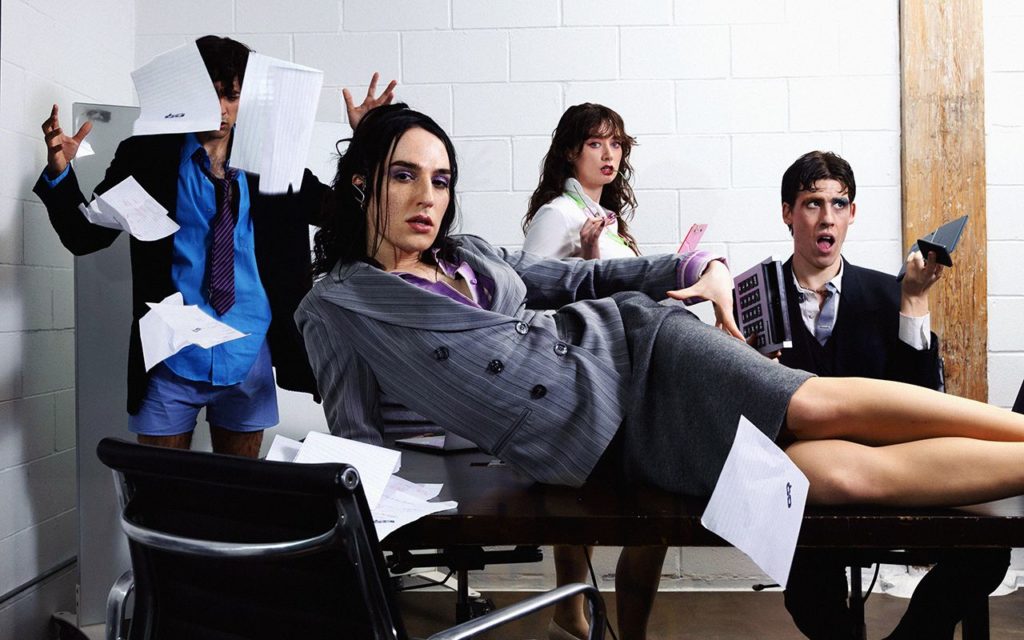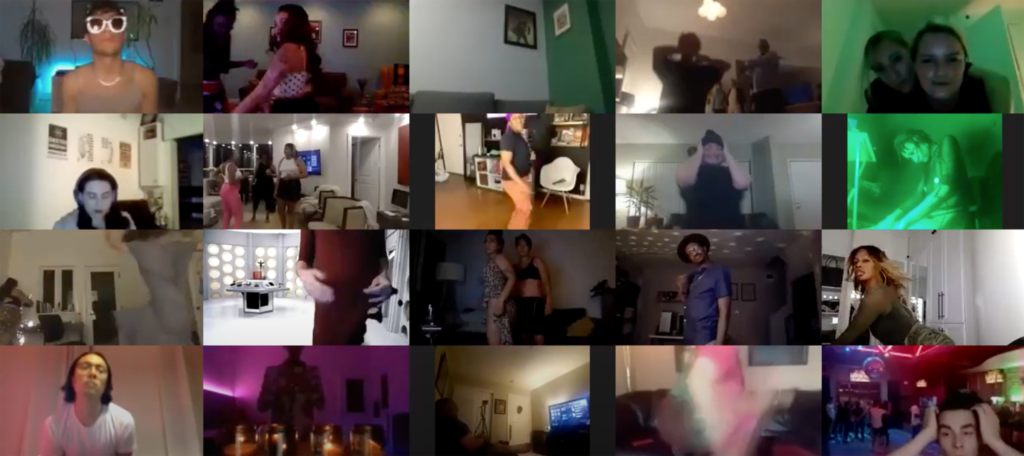
In 2021, Club Quarantine was holding their first New York City event at Bushwig, an annual drag festival. Their Uber driver, mistaking them for celebrities, asked to take a selfie with the gang, who had been arranging raves over Zoom calls when COVID began putting much of the world and its party scene into lockdown. This Uber driver later called into the online chat of the party and apparently looked a little lost. As he watched in confusion, his face was also broadcast on a screen to the entire crowd at the Knockdown Center in Queens.
Do you remember 2020? The summer sun and long hot days calling your name. Meanwhile you’re stuck at home, isolated and confused? It still feels strange to say that lockdowns are, at the moment, wrapping up while the pandemic continues to warp our way of doing things.
We were incredibly thirsty for connection and any kind of outlet in those early, concerning and confusing days of the pandemic. Anything. And if you were a lucky lil’ freak babe, you found Club Quarantine. Or more likely… Club Quarantine found you. A beautifully uplifting online queer Zoom party, Club Quarantine popped up as an online alternative to wasting away another Friday night.
Attendees often dress up and dance along to the DJs, drag acts and special guests performing for the virtual crowd. Anyone dropping by has a chance of being featured on the “Jumbotron,” spotlighted for the entire party to see. Party goers getting so lost in the moment they fall off their chair is a common recurrence.
Usually waiting to drop the Zoom link online until right before “doors” open, Club Quarantine became the place to be when you couldn’t really be anywhere at all. The online party collective quickly gained recognition and secured guest spots from the likes of Charli XCX, Rebecca Black, Lady Gaga, Caroline Polachek and more, collaborating with the humble clubbing experiment.
“It all happened so fast. You can’t process it in the moment or your brain would literally explode,” says Club Quarantine, in a collaborative email. “It wasn’t until about a year passed, that we were all like “Wow, that really happened.” Even when Gaga came on we remember downplaying it just so we could do it without our adrenaline taking over. Going viral is a mind fuck, definitely not for the faint of heart.”

Club Quarantine members Brad Allen, Erin Logan, Ceréna Sierra and Casey MQ had known each other prior to COVID — through relationships, friendships, nightclubs. The four worked various gigs throughout creative industries such as film, music production, creative direction and social media. Based out of Toronto, their first broadcast was on the same day the Ontario government called for a lockdown on all ‘non-essential businesses’ such as bars, clubs and restaurants. The initial party only gathered around a dozen virtual attendees.
“When the lockdown began and we couldn’t see each other, our relationships shifted purely onto Zoom,” says Club Quarantine. “Thankfully, our relationships have blossomed through both.”
With the party scene re-emerging from the last two years, Club Quarantine has been expanding their operations into real-world events, proving just as popular offline as they have been online. Seeing each other without the need of a screen produced a lot of tears and “gay screaming,” but the lessons the Club Quarantine crew have gleaned on the way there has also created a sense of duty to continue online clubbing options.
“To think virtual parties should die after the pandemic is ableist as hell,” says Club Quarantine. “Why can’t a queer with a wheelchair, or a neurodivergent gay in the midwest not be able to be a part of queer nightlife in some way?”
Difficulties for people with disabilities and people with compromised immune systems existed long before COVID, but the pandemic has made them more difficult to overlook, especially as COVID resources have begun to tap out before the actual virus has. Moreover, hostility towards queer communities is hitting another fever pitch, so while people in New York and Toronto may be able to find safe havens, digital venues like Club Quarantine can provide an oasis for those elsewhere in need. Even their real-world events will be hybridized with online components. Both the virtual and nonvirtual are able to see each other on live feeds from both ends, ensuring anyone, anywhere, can come in for a good time.
“We were birthed from the pandemic, of course, but what URL parties showed us was the need for accessibility in queer nightlife,” says Club Quarantine. “We are never going to abandon the community that made us.”
